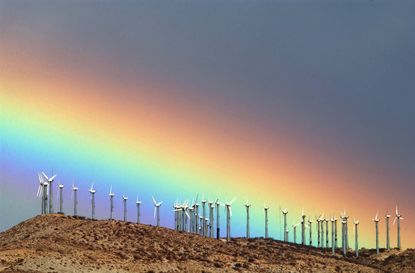4 reasons not to completely despair about climate change in 2017
The world is ready to resist Trump's climate change denialism


The end of 2016 has not been a sunny time for climate activists.
As the Trump administration takes shape, it has become crystal clear that the president-elect's climate change denialism will soon become de facto U.S. policy. And Trump will not only have many options for rolling back the progress President Obama made to curb carbon emissions, he already is putting in place the personnel to do it. Trump's proposed picks include: for head of the EPA, Oklahoma Attorney General Scott Pruitt, who is currently suing the agency; for secretary of the interior, Rep. Ryan Zinke (R-Mont.), who despite his support for protecting public lands, is lukewarm on climate issues; and, for state department secretary — the face of the United States in international climate negotiations — Rex Tillerson, the CEO of ExxonMobil who is locked in a battle with the descendants of the oil company's founder over its role in distorting the evidence of climate change.
Not all of the news is this bleak, however. As the year ends, there are some pockets of optimism:
Subscribe to The Week
Escape your echo chamber. Get the facts behind the news, plus analysis from multiple perspectives.

Sign up for The Week's Free Newsletters
From our morning news briefing to a weekly Good News Newsletter, get the best of The Week delivered directly to your inbox.
From our morning news briefing to a weekly Good News Newsletter, get the best of The Week delivered directly to your inbox.
1. Other nations are not waiting for the U.S.
The international community is not content to wait on a United States that looks increasingly likely to backslide on its climate commitments. China has become more active in projecting its leadership on the issues (for better or worse) and will soon begin to implement a nationwide cap-and-trade system. Canada is paving the way for a national carbon tax. India has inaugurated the world's largest solar power plant and may not build new coal plants after 2022. An auction in Chile in August generated the lowest bid price for solar power ever. From its dedication to phasing out fossil fuels to providing diplomatic momentum for climate talks, South America offers some promise in what looks like an increasingly dark time.
2. U.S. states and cities aren't giving up the fight either.
California Gov. Jerry Brown (D) energized a lot of people with a fiery speech at the American Geophysical Union, declaring his state will pick up where the federal government leaves off: "If Trump turns off the satellites, California will launch its own damn satellite." California has long been a leader on climate issues, creating its own cap-and-trade program and creating a policy environment to allow for the aggressive expansion of renewables. And his state is not alone. States and cities across the country are working under the assumption that climate change is real and policies need to adjust accordingly. Rhode Island just debuted the first offshore wind farm, in what is being billed as yet another example of the declining cost of renewables.
Sign up for Today's Best Articles in your inbox
A free daily email with the biggest news stories of the day – and the best features from TheWeek.com
3. Public opinion is on the side of action.
Though Trump is not exactly eager to admit it, he lost the popular vote by an historic margin. While climate change may not have been the driving force behind that rejection, there is a strong foundation of public support for doing something about it. According to Gallup polling, Americans entered the presidential election period more worried about climate change than at any other point in the previous eight years. Seventy-one percent of Americans believe the country should continue to participate in the Paris Agreements, including a majority of Republicans. While a Trump administration could chip away at that level of support, it would be an uphill climb to erase it completely.
4. Even the most fossil fuel-dependent entities are starting to plan for a less-carbon intensive future.
In November, Royal Dutch Shell speculated that the world's demand for oil would peak within the next five to 15 years. In anticipation, Shell is expanding its work in natural gas, biofuels, and hydrogen fuel, lest it lose either market value or its competitive edge from stranded carbon assets (fossil fuels it owns but cannot burn). Even Saudi Arabia, a kingdom built on decades of oil revenue, realizes its future is in diversifying its economy. While it will be a long time before we can judge the success of these reforms, the fact that they are being put forward is noteworthy in of itself.
The state of international climate action faces a period of serious uncertainty beginning in January 2017. It will be a tall order for the rest of the world to counterbalance a U.S. retreat from responsibility — but we're already starting to see that it's possible.
Create an account with the same email registered to your subscription to unlock access.
Neil Bhatiya is a Policy Associate at The Century Foundation, where he works on issues related to U.S. foreign policy, with a specific focus on South Asia and climate change.
-
 'Biden is smart to keep the border-security pressure on'
'Biden is smart to keep the border-security pressure on'Instant Opinion Opinion, comment and editorials of the day
By Harold Maass, The Week US Published
-
 Bird flu worries mount as virus found in milk, cows
Bird flu worries mount as virus found in milk, cowsSpeed Read The FDA found traces of the virus in pasteurized grocery store milk
By Peter Weber, The Week US Published
-
 Palazzo Durazzo Suites in Genoa: a palatial gem in northern Italy
Palazzo Durazzo Suites in Genoa: a palatial gem in northern ItalyThe Week Recommends Live your Italian dream in this astonishing and recently restored palace in the heart of the city
By Nick Hendry Published
-
 Arizona court reinstates 1864 abortion ban
Arizona court reinstates 1864 abortion banSpeed Read The law makes all abortions illegal in the state except to save the mother's life
By Rafi Schwartz, The Week US Published
-
 Trump, billions richer, is selling Bibles
Trump, billions richer, is selling BiblesSpeed Read The former president is hawking a $60 "God Bless the USA Bible"
By Peter Weber, The Week US Published
-
 The debate about Biden's age and mental fitness
The debate about Biden's age and mental fitnessIn Depth Some critics argue Biden is too old to run again. Does the argument have merit?
By Grayson Quay Published
-
 How would a second Trump presidency affect Britain?
How would a second Trump presidency affect Britain?Today's Big Question Re-election of Republican frontrunner could threaten UK security, warns former head of secret service
By Harriet Marsden, The Week UK Published
-
 'Rwanda plan is less a deterrent and more a bluff'
'Rwanda plan is less a deterrent and more a bluff'Instant Opinion Opinion, comment and editorials of the day
By The Week UK Published
-
 Henry Kissinger dies aged 100: a complicated legacy?
Henry Kissinger dies aged 100: a complicated legacy?Talking Point Top US diplomat and Nobel Peace Prize winner remembered as both foreign policy genius and war criminal
By Harriet Marsden, The Week UK Last updated
-
 Trump’s rhetoric: a shift to 'straight-up Nazi talk'
Trump’s rhetoric: a shift to 'straight-up Nazi talk'Why everyone's talking about Would-be president's sinister language is backed by an incendiary policy agenda, say commentators
By The Week UK Published
-
 More covfefe: is the world ready for a second Donald Trump presidency?
More covfefe: is the world ready for a second Donald Trump presidency?Today's Big Question Republican's re-election would be a 'nightmare' scenario for Europe, Ukraine and the West
By Sorcha Bradley, The Week UK Published